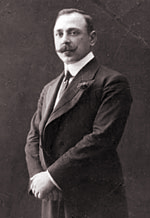Atanas Burow
Atanas Dimitrow Burow ( Bulgarian Атанас Димитров Буров, born January 30, 1875 in Gorna Orjachowiza , Ottoman Empire , today Bulgaria ; † May 15, 1954 , Pazardzhik ) was a Bulgarian banker and politician of the Bulgarian Conservative People's Party .
Life
The Burow family was involved in the Bulgarian rebirth and the industrialization of Bulgaria, Atanas' father Dimitar founded the bank "Burow DA and Co." in Gorna Orjachowiza as early as 1862 , which was able to expand strongly after the independence of the Principality of Bulgaria , was listed on the stock exchange and 1891 the first insurance company (Bulgarian България: Първо българско застрахователно дружество ) and in 1895 the country's first commercial bank (Bulgarian Българска ткърговска ) founded банрговска .
Atanas attended the elite Aprilow Grammar School in Gabrovo, which he graduated in 1895. Like his older brother Iwan, who attended the commercial academy of the Viennese merchant class and later gained experience at Crédit Lyonnais in Marseille , Atanas was also sent abroad. Between 1895 and 1900 he studied economics and law at the Sorbonne in Paris .
After graduating, Atanas returned to Bulgaria and worked between 1900 and 1910 in family businesses in Bulgaria and their branches in Switzerland and Great Britain , where he quickly made a name for himself.
Political career
After success in business and industry, Atanas turned to politics. He joined the People's Party and in 1911 became a member of the Third Grand National Assembly . He published his political ideas, which were pro-Western and not always Russia friendly, in the newspaper “Frieden” (Bulgarian Мир / Mir).
He soon became one of the leading men in the People's Party, which in 1920 became the United National Progressive Party . Atanas Burow was a member of the " Ordinary Bulgarian National Assembly " from 1911 to 1934 . During the First Balkan War Burow took part in combat operations as a non-commissioned officer as a volunteer, for which he received the medal of bravery . In December 1912, however, Burow returned to Sofia and was appointed deputy chairman of parliament.
He held the offices of Minister of Economics in 1913 and 1919/20, Minister of Foreign Affairs 1926–1931 and Minister without portfolio for a few days in 1944.
Burow always stood up for democracy , the constitutional system and parliamentarism and thus against the autocratic and totalitarian regimes in the Bulgarian political system , which was often on the edge of a dictatorship .
As foreign minister, the prudent Anglophile banker Burow broke the isolation of Bulgaria after its defeat in the First World War and achieved admission to the League of Nations . Burow, together with Finance Minister Molow (who also came from an influential banking family), despite the international isolation, was able to secure several foreign loans that were urgently needed to stabilize the Bulgarian fiscal policy. Furthermore, he was able to reduce the reparation payments or partially end them completely. He always advocated a balanced and friendly policy towards Bulgaria's neighbors. The Inter-Allied Control Commission also left the country in 1927 as a result of the successful policies of Prime Minister Andrei Lyaptschew and his most important minister, Burow.
In 1920 Burow was elected secretary of the United National Progressive Party . As such, he worked actively to reduce the influence of the Bulgarian left. For this purpose he founded the political organization Volkseintracht (Bulgarian Народен сговор / Naroden Sgowor ) with like-minded people . He was also chairman of the Bulgarian Chamber of Commerce for many years. In 1925 he was injured during the bombing of the Sveta Nedelya Cathedral .
After the end of World War II , Burow was sentenced to one year imprisonment by a “socialist people's court” under the communists whose takeover he opposed, and the family's property was confiscated in the name of the “socialist people” . In 1948 the Burow family was expelled from Sofia and had to settle in Drjanowo because Atanas Burow had joined the anti-communist resistance. In 1950, however, Burow was imprisoned again. In 1952 he received a prison term, and died in 1954 in prison for political prisoners in Pazardzhik.
Today a foundation, as well as several commercial schools and other educational institutions in Bulgaria bear his name.
literature
- Valentin G. Aleksandrov: Atanas Burov: Banker, Politics, Diplomat Politicheska Biografiia . Publisher Anteni, Sofia 1992, ISBN 978-954-8075-01-5 . (Bulgarian)
Web links
- Atanas Burov Foundation
- Brief biography and quotations from Atanas Burow (Bulgarian) , July 19, 2008
Individual evidence
- ^ Richard J. Crampton: Bulgaria . Oxford University Press 2007, ISBN 0-19-820514-7 , p. 236.
- ↑ Stefan Troebst: The Macedonian Century. From the beginnings of the national revolutionary movement to the Ohrid Agreement 1893–2001. Selected essays. Verlag Oldenbourg, Munich 1996, ISBN 978-3-486-58050-1 , p. 101.
| predecessor | Office | successor |
|---|---|---|
| Christo Kalfow |
Foreign Minister of the Kingdom of Bulgaria January 4, 1926 to June 29, 1931 |
Aleksandar Malinov |
| personal data | |
|---|---|
| SURNAME | Burow, Atanas |
| ALTERNATIVE NAMES | Burov, Atanas Dimitrov; Буров, Атанас Димитров (Bulgarian) |
| BRIEF DESCRIPTION | Bulgarian banker, politician and Bulgarian Foreign Minister (1926–1931) |
| DATE OF BIRTH | January 30, 1875 |
| PLACE OF BIRTH | Gorna Orjachowiza , today Bulgaria |
| DATE OF DEATH | May 15, 1954 |
| Place of death | Pazardzhik |
